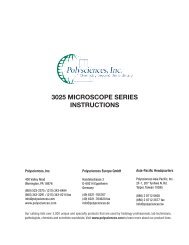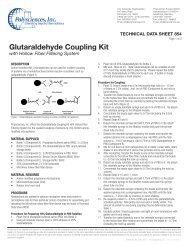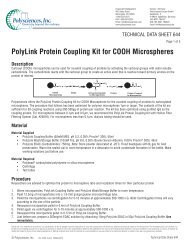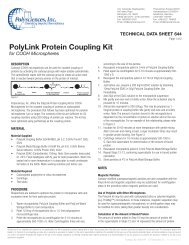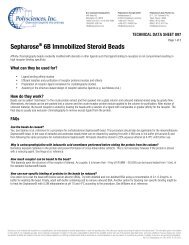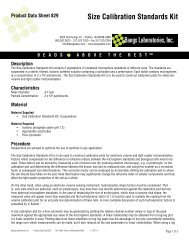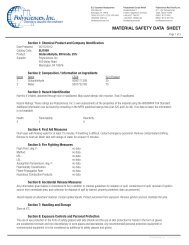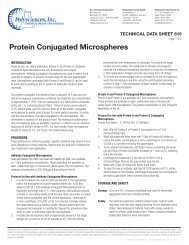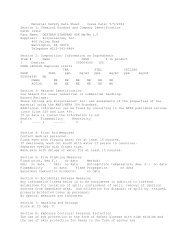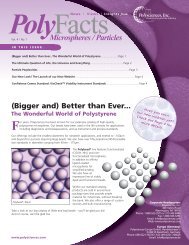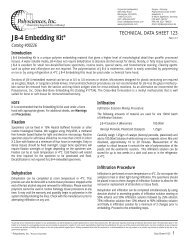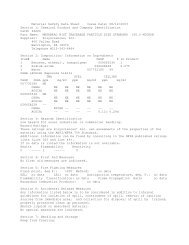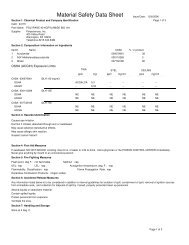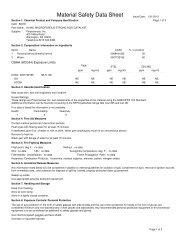- Page 1 and 2:
Chemistry Beyond the Ordinary BioSc
- Page 3 and 4:
Table of Contents Using this Catalo
- Page 5 and 6:
17. Ratio of Mw/Mn where available
- Page 7 and 8:
Biochemicals Buffers Histology & Mi
- Page 9 and 10:
BioSciences BioSciences We are plea
- Page 11 and 12:
Certified Dyes BioSciences Product
- Page 13 and 14:
Biochemicals BioSciences AITC [6241
- Page 15 and 16:
Biochemicals BioSciences SAR-GEL ®
- Page 17 and 18:
Buffers BioSciences Tris-Borate-EDT
- Page 19 and 20:
Histology & Microscopy Certified Dy
- Page 21 and 22:
Histology & Microscopy BioSciences
- Page 23 and 24:
Histology & Microscopy BioSciences
- Page 25 and 26:
Histology & Microscopy BioSciences
- Page 27 and 28:
Histology & Microscopy BioSciences
- Page 29 and 30:
Histology & Microscopy Capsule Hold
- Page 31 and 32:
Histology & Microscopy BioSciences
- Page 33 and 34:
Histology & Microscopy Bouin’s Fi
- Page 35 and 36:
Histology & Microscopy BioSciences
- Page 37 and 38:
Histology & Microscopy BioSciences
- Page 39 and 40:
Histology & Microscopy BioSciences
- Page 41 and 42:
Histology & Microscopy BioSciences
- Page 43 and 44:
Immunohistochemistry (IHC) BioScien
- Page 45 and 46:
Histology & Microscopy Coverslips M
- Page 47 and 48:
Histology & Microscopy BioSciences
- Page 49 and 50:
Histology & Microscopy BioSciences
- Page 51 and 52:
Histology & Microscopy BioSciences
- Page 53 and 54:
Histology & Microscopy Plastic Embe
- Page 55 and 56:
Histology & Microscopy JB-4 ® Embe
- Page 57 and 58:
Histology & Microscopy BioSciences
- Page 59 and 60:
Histology & Microscopy BioSciences
- Page 61 and 62:
Histology & Microscopy Poly(ethylen
- Page 63 and 64:
Histology & Microscopy BioSciences
- Page 65 and 66:
Histology & Microscopy BioSciences
- Page 67 and 68:
Histology & Microscopy BioSciences
- Page 69 and 70:
Histology & Microscopy BioSciences
- Page 71 and 72:
Histology & Microscopy BioSciences
- Page 73 and 74:
Electron Microscopy BioSciences Cat
- Page 75 and 76:
Electron Microscopy BioSciences Cat
- Page 77 and 78:
Electron Microscopy Grids - Slot Bi
- Page 79 and 80:
Electron Microscopy BioSciences Cat
- Page 81 and 82:
Electron Microscopy EM Reagents Bio
- Page 83 and 84:
Electron Microscopy BioSciences Thi
- Page 85 and 86:
Electron Microscopy BioSciences Twe
- Page 87 and 88:
Electrophoresis Reagents BioScience
- Page 89 and 90:
Fluorescent Dyes & Stains Fluoresce
- Page 91 and 92:
Fluorescent Dyes & Stains BioScienc
- Page 93 and 94:
Fluorescent Dyes & Stains BioScienc
- Page 95 and 96:
Microbiology BioSciences Plastic Mi
- Page 97 and 98:
Microbiology BioSciences Microring
- Page 99 and 100:
Microbiology BioSciences Urease Str
- Page 101 and 102:
Molecular Biology BioSciences Filip
- Page 103 and 104:
Molecular Biology Molecular Labelin
- Page 105 and 106:
Molecular Biology BioSciences New!
- Page 107 and 108:
Molecular Biology BioSciences Estra
- Page 109 and 110:
Accessories Equipment Inverted Fluo
- Page 111 and 112:
Accessories Gloves BioSciences Glov
- Page 113 and 114:
Accessories BioSciences Stirrer, po
- Page 115 and 116:
Accessories Tape BioSciences Silver
- Page 117 and 118:
Anatomic Pathology Abraxis Diagnost
- Page 119 and 120:
Abraxis Diagnostic Kits BioSciences
- Page 121 and 122:
Monomers Polymers Adjuncts Polymer
- Page 123 and 124:
Monomers Monomers Polysciences stoc
- Page 125 and 126:
Monomers Catalog Size Page Acrylic
- Page 127 and 128:
Monomers Catalog Size Page Amine Co
- Page 129 and 130:
Monomers Catalog Size Page Crosslin
- Page 131 and 132:
Monomers Catalog Size Page Polymeri
- Page 133 and 134:
Polymerizable Sites Homopolymer Tg
- Page 135 and 136:
Monomers Catalog Size Page Styrenic
- Page 137 and 138:
Polymerizable Sites Add’l. Reacti
- Page 139 and 140:
Monomers New! 1-(Acryloyloxy)-3-(Me
- Page 141 and 142: Monomers Beta-Carboxyethyl Acrylate
- Page 143 and 144: Monomers 1,4-Butanediol dimethacryl
- Page 145 and 146: Monomers 3-Chlorostyrene, 98% [2039
- Page 147 and 148: Monomers Diallylamine, min. 98% [12
- Page 149 and 150: Monomers N-[3-(N,N-Dimethylamino)pr
- Page 151 and 152: Monomers Ethylene glycol diglycidyl
- Page 153 and 154: Monomers 1H,1H,2H,2H-Heptadecafluor
- Page 155 and 156: Monomers N-(2-Hydroxyethyl) Carbazo
- Page 157 and 158: - M - Monomers Magnesium acrylate [
- Page 159 and 160: Monomers Methacryloyl fluoride [381
- Page 161 and 162: Monomers New! Nile Blue Methacrylam
- Page 163 and 164: Monomers 2-Phenoxyethyl methacrylat
- Page 165 and 166: Monomers N-iso-Propylacrylamide [22
- Page 167 and 168: Monomers Triallyl cyanurate [101-37
- Page 169 and 170: Monomers Vinyl azlactone [29513-26-
- Page 171 and 172: Polymers Polymers Selection Guide P
- Page 173 and 174: Acrylate & Methacrylate Polymers Po
- Page 175 and 176: Polymers Catalog Size Page Mol. Wei
- Page 177 and 178: Polylactic Acid & Polyethylene Glyc
- Page 179 and 180: Phenol-functional Polymers Polymers
- Page 181 and 182: Hydroxyl Functional Polymers Polyme
- Page 183 and 184: Mol. Weight Form Comments Poly(2-di
- Page 185 and 186: Alphabetical Listing of Polymers -
- Page 187 and 188: Polymers Dextran, DEAE ether [9015-
- Page 189 and 190: Polymers Halocarbon 700 Oil [Poly(c
- Page 191: Poly(diallyldimethylammonium chlori
- Page 195 and 196: Polymers Poly(2-dimethylaminoethyl
- Page 197 and 198: Poly(ethylene glycol) (n) diacrylat
- Page 199 and 200: Polymers Poly(ethylene glycol) / Po
- Page 201 and 202: Poly(ethylene/vinyl alcohol) [25067
- Page 203 and 204: Polymers Poly(1-glycerol methacryla
- Page 205 and 206: Poly(l-lactide/glycolide) [70:30] [
- Page 207 and 208: Polymers Poly(methyl methacrylate/n
- Page 209 and 210: Polymers Poly(styrene/butadiene) 85
- Page 211 and 212: Polymers Poly(vinyl chloride) [9002
- Page 213 and 214: Polymers Poly(N-vinylpyrrolidone/2-
- Page 215 and 216: Alphabetical Listing of Adjuncts -
- Page 217 and 218: Adjuncts 2-(2’-Hydroxy-5’-methy
- Page 219 and 220: - M•N•O•P - Adjuncts Methyl B
- Page 221 and 222: Standards Polymer Standards & Kits
- Page 223 and 224: Standards Catalog Size MW ~12,000 M
- Page 225 and 226: Molecular Weight Standard Kits Stan
- Page 227 and 228: Organic Intermediates & Specialties
- Page 229 and 230: Stable Isotope Compounds Stable Iso
- Page 231 and 232: Stable Isotope Compounds Biotin-[2H
- Page 233 and 234: Stable Isotope Compounds Cortisol-[
- Page 235 and 236: Stable Isotope Compounds Dehydroepi
- Page 237 and 238: Stable Isotope Compounds Dihydrotes
- Page 239 and 240: Stable Isotope Compounds L-3,3’-D
- Page 241 and 242: Stable Isotope Compounds 17b-Estrad
- Page 243 and 244:
Stable Isotope Compounds 6b-Hydroxy
- Page 245 and 246:
Stable Isotope Compounds 25-Hydroxy
- Page 247 and 248:
Stable Isotope Compounds 2-Methoxy-
- Page 249 and 250:
Stable Isotope Compounds 7-Methylxa
- Page 251 and 252:
Stable Isotope Compounds Pyridoxal-
- Page 253 and 254:
Stable Isotope Compounds Testostero
- Page 255 and 256:
Stable Isotope Compounds 1,3,7-Trim
- Page 257 and 258:
Stable Isotope Compounds Vitamin D3
- Page 259 and 260:
NIST Traceable Size Standards Polys
- Page 261 and 262:
Microspheres / Particles Microspher
- Page 263 and 264:
How Particles Measure Up Precision
- Page 265 and 266:
NIST Traceable Size Standards Micro
- Page 267 and 268:
Polystyrene Microspheres Polybead
- Page 269 and 270:
Polystyrene Microspheres Polybead
- Page 271 and 272:
Polystyrene Microspheres Polybead
- Page 273 and 274:
Intensity Standards Microspheres &
- Page 275 and 276:
Fluorescent Microspheres Microspher
- Page 277 and 278:
Fluorescent Microspheres Fluoresbri
- Page 279 and 280:
Protein Conjugated Microspheres Mic
- Page 281 and 282:
Microspheres & Particles Flow Cytom
- Page 283 and 284:
Flow Cytometry Bangs Flow Cytometry
- Page 285 and 286:
Flow Cytometry Microspheres & Parti
- Page 287 and 288:
Flow Cytometry Microspheres & Parti
- Page 289 and 290:
Flow Cytometry Microspheres & Parti
- Page 291 and 292:
Flow Cytometry Microspheres & Parti
- Page 293 and 294:
Magnetic Microspheres Microspheres
- Page 295 and 296:
Magnetic Microspheres BioMag ® Plu
- Page 297 and 298:
Magnetic Microspheres ProMag 1 Ser
- Page 299 and 300:
Magnetic Microspheres Microspheres
- Page 301 and 302:
Silica & Glass Microspheres Silica
- Page 303 and 304:
Buffers and Solutions Microspheres
- Page 305 and 306:
Additional Particles Microspheres &
- Page 307 and 308:
Microspheres & Particles Additional
- Page 309 and 310:
Additional Particles Surface to Vol
- Page 311 and 312:
Additional Particles Polystyrene Mi
- Page 313 and 314:
Additional Particles BioMag ® Stab
- Page 315 and 316:
Additional Particles Affinity Bindi
- Page 317 and 318:
Additional Particles Protein Coupli
- Page 319 and 320:
Additional Particles Microspheres &
- Page 321 and 322:
Wire Bond Encapsulants - NoSWEEP O
- Page 323 and 324:
Electronic Adhesives & Encapsulants
- Page 325 and 326:
NoSWEEP Wire Bond Encapsulant Elec
- Page 327 and 328:
Encapsulants for Fragile Substrates
- Page 329 and 330:
Electronic Adhesives & Encapsulants
- Page 331 and 332:
Electronic Adhesives & Encapsulants
- Page 333 and 334:
Electronic Adhesives & Encapsulants
- Page 335 and 336:
JEDEC Reference Guide IPC/JEDEC J-S
- Page 337 and 338:
Electronic Adhesives & Encapsulants
- Page 339 and 340:
EXTRACTABLE IONS: Ions in a materia
- Page 341 and 342:
SHEAR STRENGTH: Key measure of adhe
- Page 343 and 344:
Index Terms and Conditions of Sale
- Page 345 and 346:
Terms and Conditions of Sale Custom
- Page 347 and 348:
Technical Data Sheets Current list
- Page 349 and 350:
Technical Data Sheets Potting Compo
- Page 351 and 352:
Alphabetical Index Product Name Pag
- Page 353 and 354:
Alphabetical Index Product Name Pag
- Page 355 and 356:
Alphabetical Index Product Name Pag
- Page 357 and 358:
Alphabetical Index Product Name Pag
- Page 359 and 360:
Alphabetical Index Product Name Pag
- Page 361 and 362:
Alphabetical Index Product Name Pag
- Page 363 and 364:
Alphabetical Index Product Name Pag
- Page 365 and 366:
Alphabetical Index Product Name Pag
- Page 367 and 368:
Catalog Number Index Cat # Page Cat
- Page 369 and 370:
Catalog Number Index Cat # Page Cat
- Page 371 and 372:
Catalog Number Index Cat # Page Cat
- Page 373 and 374:
Catalog Number Index Cat # Page Cat
- Page 375 and 376:
Catalog Number Index Cat # Page Cat
- Page 377 and 378:
CAS Number Index CAS Number Index C
- Page 379 and 380:
CAS Number Index CAS # Page CAS # P
- Page 381 and 382:
NOTES For more information please c
- Page 383 and 384:
NOTES For more information please c
- Page 385 and 386:
For more information please call (8
- Page 387 and 388:
Australia BioScientific Pty. Ltd. 2



